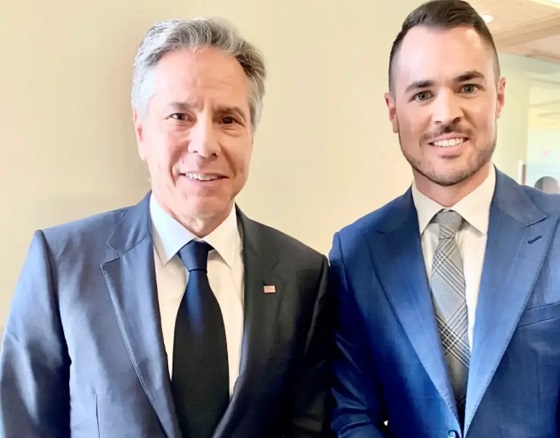Uncategorized
May: UK to seek further Brexit delay, try to break logjam

LONDON — With Britain racing toward a chaotic exit from the European Union within days, Prime Minister Theresa May veered away from the cliff-edge Tuesday, saying Britain would seek a further delay to Brexit as its politicians sought a compromise solution to the crisis.
May made the announcement after the EU’s chief negotiator warned that a disruptive and costly Brexit was likely unless Britain broke the impasse that has paralyzed the government and Parliament.
After almost three years of refusal to bend in her insistence that Britain embrace her vision of Brexit, May said the country needed “national unity to deliver the national interest.”
Following the defeat of the government’s plan and a range of lawmaker-written alternatives, May said Britain would need a further delay to its EU departure, currently scheduled for April 12. And she offered to hold talks with opposition Labour Party leader Jeremy Corbyn in an attempt to find a compromise solution.
“This debate, this division, cannot drag on much longer,” May said in a televised statement from 10 Downing St. that acknowledged her attempts to win backing for the government’s version of Brexit had failed.
European Council President Donald Tusk gave a cautious welcome to May’s change of course.
“Even if, after today, we don’t know what the end result will be, let us be patient,” he tweeted — a suggestion the EU would wait for Britain to present a clear plan.
Earlier, EU negotiator Michel Barnier offered a downbeat assessment of the situation.
“As things stand now, the no-deal option looks likely. I have to tell you the truth,” Barnier said in Brussels.
Barnier said “we can still hope to avoid it” if the intensive work in London produces a breakthrough before an April 10 EU summit.
The leaders of the EU’s 27 remaining countries have given the U.K. until April 12 to leave the bloc or to come up with a new plan, after lawmakers thrice rejected an agreement struck between the bloc and May late last year.
The House of Commons has also failed to find a majority for any alternative plan in two days of voting on multiple options.
May’s statement came after a seven-hour meeting of her Cabinet, which is split between supporters of a “soft Brexit” that keeps close economic ties with the EU, and Brexiteers who believe a no-deal exit is better than compromising.
Her words seemed to indicate that she was veering away from the possibility of a no-deal Brexit — but also that she has not given up on her own withdrawal agreement, which has been rejected by Parliament three times.
Her plan is to seek approval for the legally binding agreement — which sets out the terms of Britain’s departure and triggers a long transition period for the two sides to work out future relations — after securing cross-party political support for a vision of those future ties between the U.K. and the EU.
If she and Corbyn fail to reach agreement, May said Parliament would get to vote on a range of options — and the government would be bound by the result. It is the first time she has committed to following the instruction of lawmakers.
May said she hoped Britain could pass the agreement by May 22, in time to avoid participating in elections for the European Parliament.
A no-deal Brexit would jeopardize trade and travel, with new checks on borders and new regulations on dealings between the EU and Britain.
Barnier said the EU was prepared, but “being prepared for no deal does not mean that there will be no disruption.”
Businesses have warned that the economic impact in Britain could be devastating.
Ford of Europe Chairman Steven Armstrong said “a no-deal Brexit would be a disaster for the automotive industry in the U.K.”
Armstrong that if the U.K. can’t work out a deal on leaving the EU that guarantees “frictionless trade,” the vehicle maker “will have to consider seriously the long-term future of our investments in the country.”
Edwin Morgan, interim director general of business group the Institute of Directors, said May’s statement was “a welcome step towards compromise,” though their remained obstacles ahead.
“We urge the leader of the opposition to work with the prime minister to find a solution,” he said. “Both sides must play ball.”
Britain’s political paralysis — and May’s failure to get Parliament’s approval for the withdrawal agreement she negotiated — have exasperated EU leaders.
French President Emmanuel Macron said that if Britain’s politicians could not agree on a way forward, “they will de facto have chosen for themselves to leave without a deal.”
“We cannot avoid failure for them,” Macron said before a meeting in Paris with Irish Prime Minister Leo Varadkar.
But Varadkar stressed “there’s still time” for May to come to the April 10 summit with “credible” proposals.
British lawmakers intent on avoiding a no-deal Brexit have drawn up plans to prevent Britain crashing out of the bloc, by accident or design.
“We are now in a really dangerous situation with a serious and growing risk of no deal,” Labour Party legislator Yvette Cooper said.
Cooper introduced legislation, which Parliament is set to consider, this week, that would compel May to seek to extend the Brexit process beyond April 12 in order to prevent a no-deal departure.
___
Casert reported from Brussels. Mike Corder in Halfweg, Netherlands, contributed to this story.
___
Follow AP’s full coverage of Brexit at: https://www.apnews.com/Brexit
Jill Lawless, Raf Casert And Danica Kirka, The Associated Press
Uncategorized
Cost of bureaucracy balloons 80 per cent in 10 years: Public Accounts

The cost of the bureaucracy increased by $6 billion last year, according to newly released numbers in Public Accounts disclosures. The Canadian Taxpayers Federation is calling on Prime Minister Mark Carney to immediately shrink the bureaucracy.
“The Public Accounts show the cost of the federal bureaucracy is out of control,” said Franco Terrazzano, CTF Federal Director. “Tinkering around the edges won’t cut it, Carney needs to take urgent action to shrink the bloated federal bureaucracy.”
The federal bureaucracy cost taxpayers $71.4 billion in 2024-25, according to the Public Accounts. The cost of the federal bureaucracy increased by $6 billion, or more than nine per cent, over the last year.
The federal bureaucracy cost taxpayers $39.6 billion in 2015-16, according to the Public Accounts. That means the cost of the federal bureaucracy increased 80 per cent over the last 10 years. The government added 99,000 extra bureaucrats between 2015-16 and 2024-25.
Half of Canadians say federal services have gotten worse since 2016, despite the massive increase in the federal bureaucracy, according to a Leger poll.
Not only has the size of the bureaucracy increased, the cost of consultants, contractors and outsourcing has increased as well. The government spent $23.1 billion on “professional and special services” last year, according to the Public Accounts. That’s an 11 per cent increase over the previous year. The government’s spending on professional and special services more than doubled since 2015-16.
“Taxpayers should not be paying way more for in-house government bureaucrats and way more for outside help,” Terrazzano said. “Mere promises to find minor savings in the federal bureaucracy won’t fix Canada’s finances.
“Taxpayers need Carney to take urgent action and significantly cut the number of bureaucrats now.”
Table: Cost of bureaucracy and professional and special services, Public Accounts
| Year | Bureaucracy | Professional and special services |
|
$71,369,677,000 |
$23,145,218,000 |
|
|
$65,326,643,000 |
$20,771,477,000 |
|
|
$56,467,851,000 |
$18,591,373,000 |
|
|
$60,676,243,000 |
$17,511,078,000 |
|
|
$52,984,272,000 |
$14,720,455,000 |
|
|
$46,349,166,000 |
$13,334,341,000 |
|
|
$46,131,628,000 |
$12,940,395,000 |
|
|
$45,262,821,000 |
$12,950,619,000 |
|
|
$38,909,594,000 |
$11,910,257,000 |
|
|
$39,616,656,000 |
$11,082,974,000 |
Uncategorized
Trump Admin Establishing Council To Make Buildings Beautiful Again


From the Daily Caller News Foundation
By Jason Hopkins
The Trump administration is creating a first-of-its-kind task force aimed at ushering in a new “Golden Age” of beautiful infrastructure across the U.S.
The Department of Transportation (DOT) will announce the establishment of the Beautifying Transportation Infrastructure Council (BTIC) on Thursday, the Daily Caller News Foundation exclusively learned. The BTIC seeks to advise Transportation Secretary Sean Duffy on design and policy ideas for key infrastructure projects, including highways, bridges and transit hubs.
“What happened to our country’s proud tradition of building great, big, beautiful things?” Duffy said in a statement shared with the DCNF. “It’s time the design for America’s latest infrastructure projects reflects our nation’s strength, pride, and promise.”
“We’re engaging the best and brightest minds in architectural design and engineering to make beautiful structures that move you and bring about a new Golden Age of Transportation,” Duffy continued.
Mini scoop – here is the DOT’s rollout of its Beautifying Transportation Infrastructure Council, which will be tasked with making our buildings beautiful again. pic.twitter.com/
9iV2xSxdJM — Jason Hopkins (@jasonhopkinsdc) October 23, 2025
The DOT is encouraging nominations of the country’s best architects, urban planners, artists and others to serve on the council, according to the department. While ensuring that efficiency and safety remain a top priority, the BTIC will provide guidance on projects that “enhance” public areas and develop aesthetic performance metrics.
The new council aligns with an executive order signed by President Donald Trump in August 2025 regarding infrastructure. The “Making Federal Architecture Beautiful Again” order calls for federal public buildings in the country to “respect regional architectural heritage” and aims to prevent federal construction projects from using modernist and brutalist architecture styles, instead returning to a classical style.
“The Founders, in line with great societies before them, attached great importance to Federal civic architecture,” Trump’s order stated. “They wanted America’s public buildings to inspire the American people and encourage civic virtue.”
“President George Washington and Secretary of State Thomas Jefferson consciously modeled the most important buildings in Washington, D.C., on the classical architecture of ancient Athens and Rome,” the order continued. “Because of their proven ability to meet these requirements, classical and traditional architecture are preferred modes of architectural design.”
The DOT invested millions in major infrastructure projects since Trump’s return to the White House. Duffy announced in August a $43 million transformation initiative of the New York Penn Station in New York City and in September unveiledmajor progress in the rehabilitation and modernization of Washington Union Station in Washington, D.C.
The BTIC will comprise up to 11 members who will serve two-year terms, with the chance to be reappointed, according to the DOT. The task force will meet biannually. The deadline for nominations will end Nov. 21.
-

 Alberta3 hours ago
Alberta3 hours agoFrom Underdog to Top Broodmare
-

 International1 day ago
International1 day agoAfghan Ex–CIA Partner Accused in D.C. National Guard Ambush
-

 Alberta1 day ago
Alberta1 day agoAlberta and Ottawa ink landmark energy agreement
-

 Crime2 days ago
Crime2 days agoFBI Seizes $13-Million Mercedes Unicorn From Ryan Wedding’s Narco Network
-

 Energy1 day ago
Energy1 day agoPoilievre says West Coast Pipeline MOU is no guarantee
-

 Crime2 days ago
Crime2 days agoB.C.’s First Money-Laundering Sentence in a Decade Exposes Gaps in Global Hub for Chinese Drug Cash
-

 International2 days ago
International2 days agoTrump orders 500 more troops to reinforce D.C. after Guard shooting
-

 Artificial Intelligence2 days ago
Artificial Intelligence2 days agoTrump’s New AI Focused ‘Manhattan Project’ Adds Pressure To Grid









